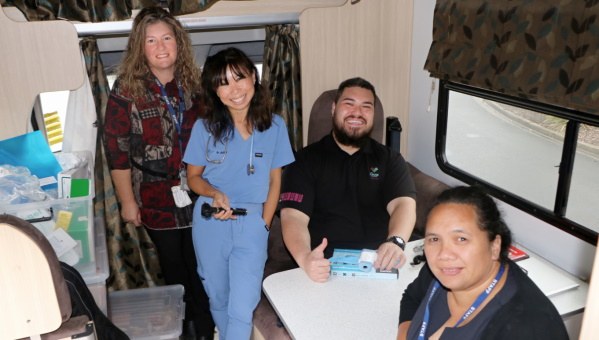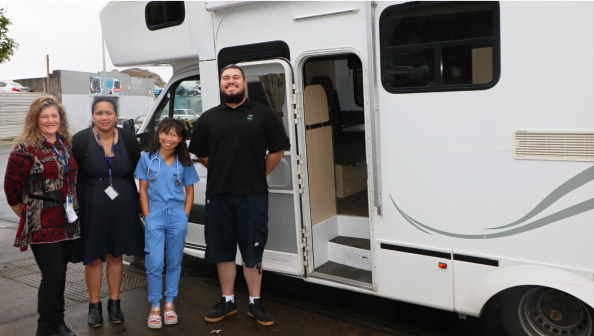 An ordinary-looking white campervan winding its way around Counties Manukau, and regularly parked up at three Manukau District Community Corrections sites, is quietly revolutionising the way south Auckland’s most vulnerable can access primary healthcare.
An ordinary-looking white campervan winding its way around Counties Manukau, and regularly parked up at three Manukau District Community Corrections sites, is quietly revolutionising the way south Auckland’s most vulnerable can access primary healthcare.
Transformed into a mobile clinic and staffed by a general practitioner (GP) and a healthcare assistant, this health service-on-wheels travels where the need is high, and resources are limited. Since February this year, the clinic has been rolling round the Papakura, Manurewa and Ōtara Community Corrections sites once a week or every other week depending on demand.
“The concept of this mobile clinic is genius in its simplicity and witnessing the initiative come to fruition is a career highlight for me,” says Papakura Community Corrections Service Manager Lyndsay Stanaway.
“The clinic and staff remain at a site for an hour and thirty minutes for consultations, but can also visit people at home, or organise a nurse to conduct a home visit.
“Our Community Corrections staff inform people who report to us, about the availability of the mobile health service, and they can pop over to the campervan clinic to see the doctor for a professional and confidential consultation – no long waiting times for appointments and no charge. Another huge plus is that extended whānau can also access this clinic,” explains Lyndsay.
 “Enhancing people’s health and wellbeing is one of the key drivers in our efforts and when I heard about the campervan clinic, I knew it would also benefit the people we support,” says Lyndsay.
“Enhancing people’s health and wellbeing is one of the key drivers in our efforts and when I heard about the campervan clinic, I knew it would also benefit the people we support,” says Lyndsay.
People can access all the healthcare support ordinarily available from a GP at a community clinic. The campervan clinic is funded as a Counties Manukau pilot project by Te Whatu Ora – Health New Zealand, and work is under way to secure ongoing financial support to keep the service going.
“The mobile service has the added advantage that it particularly reaches those who have fallen by the wayside: the ones who had not visited a doctor in years, or ever; those who had lost trust in the system, or control of their lives,” says Dr Juliette, the GP on duty and co-founder of the mobile clinic service.
“When the men and women decide to visit the clinic, I notice barriers coming down and patients feeling a little bit more equipped and empowered when they leave.”
Manurewa Lead Service Manager, Atawhai Kapa, cites some successful outcomes of the clinic.
“Recently, whānau of an adult sibling at risk of self-harm came to our site for help, as they didn’t know where else to go. Their probation officer immediately referred the family to the mobile clinic. After a consultation, the person was put in touch with an appropriate service provider for further support.”
Another success story involves a concerned father who received custody of his young children. He had no GP of his own and could not afford to register his tamariki.
“With our staff’s support, the father returned on the day of the mobile clinic’s visit, bringing with him his two tamariki. They underwent their necessary health checks, had a chance to kōrero with the GP and sorted out their future healthcare.”
“On reflection,” continues Atawhai, “the mobile clinic embodies all our Hōkai Rangi pou in such a practical and uncomplicated way, be it humanising and healing, whānau, partnerships, or incorporating te ao Māori.
“Just the other day, the clinic had a patient who wanted to connect with a Māori health service provider, and we were able to put them in touch with Manurewa Marae. This is Hōkai Rangi living and breathing on the frontline, there where the rubber hits the road.”

